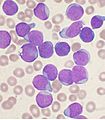Immunosuppression facts for kids
Immunosuppression is when doctors lower the activity of your immune system. Your immune system is like your body's personal army. It protects you from germs, viruses, and other things that can make you sick. But sometimes, this army can cause problems.
Doctors might use immunosuppression when your immune system needs to be calmed down. This can happen for a few important reasons. For example, it's used when someone gets a new organ, like a heart or a kidney. It's also used for certain diseases where the immune system accidentally attacks healthy parts of the body.
Contents
Understanding Your Immune System
Your immune system is an amazing network of cells and organs. Its main job is to find and destroy harmful invaders. These invaders can be things like bacteria, viruses, and fungi. It also helps to get rid of old or damaged cells in your body.
When your immune system works well, it keeps you healthy. It remembers past invaders, so it can fight them off faster next time. Think of it like a security system that learns.
Why Immunosuppression Is Needed
Sometimes, your immune system can be too active or make mistakes. When this happens, doctors need to lower its activity. This is where immunosuppression comes in. It helps to prevent serious health problems.
Organ Transplants
Imagine someone needs a new organ, like a kidney or a liver. This is called an organ transplant. The new organ comes from another person. Your immune system is very good at telling the difference between "you" and "not you."
When a new organ is put into your body, your immune system sees it as "foreign." It thinks the new organ is a harmful invader. So, your immune system tries to attack and destroy the new organ. This is called organ rejection. To stop this, doctors give medicines that lower the immune system's activity. This helps your body accept the new organ.
Autoimmune Diseases
Sometimes, the immune system makes a mistake. Instead of attacking only harmful invaders, it starts to attack healthy parts of your own body. This is called an autoimmune disease. It's like your body's army accidentally attacking its own country.
There are many different autoimmune diseases. Here are a few examples:
- Lupus: This disease can affect many parts of the body, like the joints, skin, and kidneys.
- Rheumatoid arthritis: This mainly affects the joints, causing pain and swelling.
- Multiple sclerosis: This affects the brain and spinal cord, which control how your body moves and feels.
By using immunosuppression, doctors can reduce the damage caused by these diseases. It helps to calm down the overactive immune system. This can make people feel much better and slow down the disease.
How Immunosuppression Works
Immunosuppression is usually done using special medicines. These medicines work in different ways to lower the immune system's activity. They can stop immune cells from growing or block signals that tell them to attack.
One common type of medicine used for this is called Cortisol. Cortisol is a type of steroid. It helps to reduce inflammation and calm the immune system. Doctors carefully choose the right medicine and dose for each person. They want to lower the immune system enough to help, but not so much that it causes other problems.
Living with Immunosuppression
People who are on immunosuppression medicines need to be careful. Because their immune system is less active, they might get sick more easily. They need to avoid germs and infections. Doctors often give them advice on how to stay healthy. This might include washing hands often and avoiding people who are sick.
Even with these challenges, immunosuppression is a very important medical treatment. It helps many people live healthier and longer lives, especially after organ transplants or with autoimmune diseases.
Images for kids
See also
 In Spanish: Inmunosupresión para niños
In Spanish: Inmunosupresión para niños
 | Bessie Coleman |
 | Spann Watson |
 | Jill E. Brown |
 | Sherman W. White |




